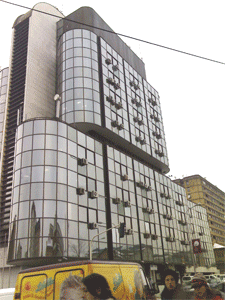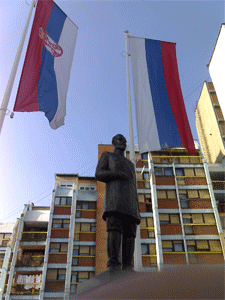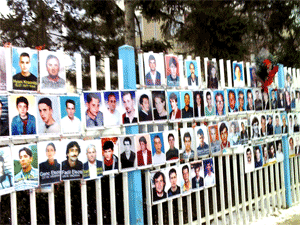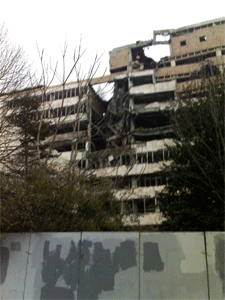
 Special Reportage
Special Reportage
Kosovo is a region on the Balkan Peninsula discussed by people, involved in politics or not, the world over. Georgians are not exception to this rule, however, often speaking of the supposed independence of the region.
The great interest in Kosovo among Georgians is very simple. The so-called South Ossetia region (Tskhinvali region) and the de-facto republic of Abkhazia openly claim that if Kosovo becomes an independent state they have the right to a similar, independent status. Russia supports the regions and has been delivering ultimatums to Europe for quite some time.
Every Georgian citizen, particularly residents of the Tskhivnali and Abkhazia regions, is curious as to why independence for Kosovo could be a precedent for the independence of other frozen conflicts. The Dutch Organization IKVPAX CHRISTI invited a delegation of Georgian and Ossetian representatives to Serbia and Kosovo to find the answers to such questions. I represented the Human Rights Center, a Georgian non-governmental organization, as I am a child of a mixed-family (Georgian-Ossetian).
Upon my arrival in Belgrade any fear, which is so common when in conflict regions, disappeared. Serbia is a normal Eastern European country, one of those republics caught under the ruins of the Socialist Empire. “The most powerful states of the world” use this country to share a space of influence between each other. Actors in this game are different, as an enemy of Georgia is friend and supporter of Serbia and vice versa.
Belgrade is a typical capital of an Eastern European country. It is a pity that Serbia has not developed much since the Socialist Empire of Yugoslavia collapsed. There is no time for development here. In the morning people go to work in a hurry, although unemployment is a great problem for this country as well. Despite the ostentatious peace, you can feel the fear of war here. I was particularly afraid when I saw buildings close to our hotel that had been bombed by NATO in 1999. The North Atlantic Treaty Organization bombed Belgrade over a span of three months, resulting in approximately 2,000 deaths. Hostilities broke out to stop Serbians from committing genocidal acts against Kosovo Albanians.
After the bombing, the situation transitioned into a frozen conflict. Thousands of Albanians and Serbians died as a result of the bloodshed. Several thousands of people are still considered “lost” as a result of the hostilities. There are many IDPs in Serbia and Kosovo and their living conditions are not much better than our Georgian IDPs. The dominant republic of the former Yugoslav empire faces many problems in the 21st century.
 On December 16th, our delegation left Belgrade for the capital of Kosovo, Pristina. The trip was long and tiresome, taking six hours to get to reach the capital. The fresh snow made our trip even more difficult. During our travels I expected NATO soldiers to stop our mini-bus and interrogate us with their strict faces. In fact, we only saw NATO soldiers at the border to Kosovo. No interrogation took place, as they merely checked our passports and gave us a permit paper to enter Kosovo.
On December 16th, our delegation left Belgrade for the capital of Kosovo, Pristina. The trip was long and tiresome, taking six hours to get to reach the capital. The fresh snow made our trip even more difficult. During our travels I expected NATO soldiers to stop our mini-bus and interrogate us with their strict faces. In fact, we only saw NATO soldiers at the border to Kosovo. No interrogation took place, as they merely checked our passports and gave us a permit paper to enter Kosovo.
Something curious took place at the Custom’s House, however, as we observed drivers replacing the license plates of their cars. If they are going to Kosovo, they change their Serbian plates to Kosovo ones and vise versa.
Kosovo is a less developed area than Serbia and more natural, as for years it was only a province within Yugoslavia and had less of a chance to develop. Pristina has recently begun restoration of buildings damaged during the war. During the war the city was completely destroyed, although the city center has retained its old face. The look is not very beautiful, however, with no cultural monuments or other sightseeing to be had in the city. Locals will show visitors only the newly built “European” standard buildings of NATO, the European Union and other international organizations.
Peace is tenuous in Kosovo. You sometimes hear New Year rockets and fireworks in the city and you cannot help but be a bit afraid. In Kosovo, war could be unleashed at any minute.
Kosovo Albanians demand independence from Serbia and wonder why “if Bosnia-Herzogovina, Montenegro, Croatia and Macedonia have gained independence after Yugoslavia collapsed, why would Kosovo not gain it as well?” If we listen to the Serbian people, they claim that “Kosovo was a province and not a republic” within the socialist empire.
Albanians are Muslims and Serbs are Christian, giving their conflict elements of religious controversy that is not an applicable factor in similar situations.
A few Serbs live in Kosovo, where the Orthodox Churches are not active. There are only Mosques in Kosovo, even though Albanians are not very religious people.
There is only one church in Pristina, the construction of which began before the war and has yet to resume. According to one Serbian girl, the church site has recently become a public toilet. Albanians categorically deny this claim, saying that the church is protected by soldiers and that no one can enter it for impudent purposes. Unfortunately, we were unable to visit the church and find out who was right.
Our delegation met various social and political unions in Pristina during our time there. We met radical young patriots and calm politicians who never say more than must be said. Regardless of their approach, everyone we met want to live in an independent Kosovo.
Serbs live in enclaves throughout Kosovo. These are small settlements where the pulse of life cannot be felt at all. During the war these villages were bombed and the houses razed. The UN Mission in Kosovo (UNMIK) reconstructed houses for Serbs, but found that few were willing to return to the enclaves and live in constant fear.
Gracanica is one of the biggest Serb enclaves in Kosovo. Serbs receive a bit more financial support from international organizations here and there is an active Orthodox Church. A barbed wire topped fence surrounds the church, and at first sight you might think it is a military base.
 Local villages look like Georgian provincial towns. Houses are comfortable here and there are entertainment lounges and café-bars in the village frequented by young people. These distractions allow them to forget for a short time that soon they will have to abandon their native houses.
Local villages look like Georgian provincial towns. Houses are comfortable here and there are entertainment lounges and café-bars in the village frequented by young people. These distractions allow them to forget for a short time that soon they will have to abandon their native houses.
We also visited the Serbian enclave of Babliak. The UNMIK has built forty houses for Serbian returnees there, but only twenty Serbs have returned so far. Those that have come back are sitting on suitcases, waiting for the final settlement of Kosovo’s status. Their children cannot go to the newly built school because there is no Serbian teacher, so only Albanian children attend. NATO uniformed soldiers follow us everywhere. It is their responsibility to protect us but no danger awaits us in this tiny village.
Sprce, a mountainous resort village in Kosovo, is an hour from Pristina. Sprce is another Serbian enclave surrounded by Albanian settlements and bordered by Macedonia to the South. None of the local Serbs intend to stay in Sprce if Kosovo is granted independence. Residents of Georgian mountain villages would have been annoyed if they had seen this enclave. Houses are comfortable and the roads are new. Similar living conditions to this mountainous village in Kosovo cannot be found in even the big towns of Georgia.
As for Kosovo’s independence, after meeting with representatives of the European Union each member of our delegation was sure that by the spring of 2008 Kosovo would be independent, although not a classically independent state.
International organizations will be observers in Kosovo, with the European Union as the leader among them and the capital of Kosovo will be Brussels, not Pristina. The advisor to the future Prime Minister of Kosovo claimed as much during our meeting. It is a bit strange to offer similar status to patriot members of the Albanian Youth Organization “Self-Determination,” but it is being done. Kosovo will not be a completely independent country but it will not be a part of Serbia either. The EU will have a new member state, but there will not be a new country on the European continent.
Despite the already settled future of Kosovo, the Serbian people are not going to surrender. Mitrovica is a city in the north of Kosovo at the Serbian border. It is divided into two by a “legendary” bridge where city inhabitants cannot walk, as it separates the southern, Albanian part of the city from the northern, Serbian part. Neither population is very eager to interact with one another. Many bloody accidents have occurred on this militant-protected bridge. Photos are not permitted, but if you slip down in the back seat of a car you can take at least one photo.
The Georgian-Ossetian delegation managed to visit both sides of Mitrovica. Local Serbs are very radical since the city is part of Kosovo but located close to Serbia. If Kosovo gains independence, the predominantly Serb population of Mitrovica will find themselves in a very awkward situation. This town thus intends to declare independence within Kosovo, possibly leading to another war. International organizations carrying out missions in Kosovo claim that if the situation gets tense in Mitrovica they will send such a large contingent of NATO troops to the city that local inhabitants will not be able to shake hands.
As I was leaving Kosovo, I felt sorry for the Serbs who still live in enclaves, locked in their houses, waiting for the time they will have to abandon their homes and travel in an unidentified direction in search of temporary shelter. Those who want to share the Balkan Peninsula do not care about a young Serbian girl with the Georgian name of "Maia". Maia lives in a dark house in a Serbian enclave and goes to University 45 kilometers away because she could not find a place at Pristina University three kilometers away because she is Serbian.
Nino Tlashadze, special report from Kosovo



